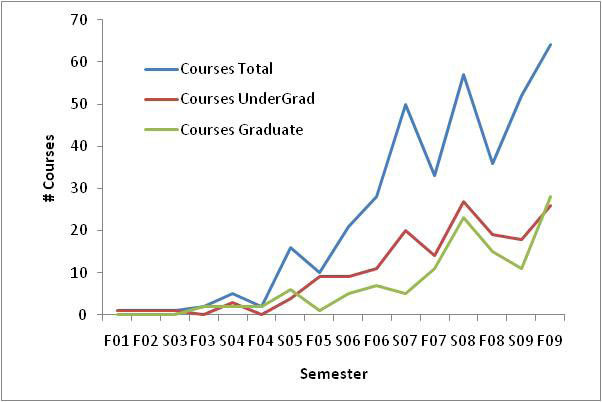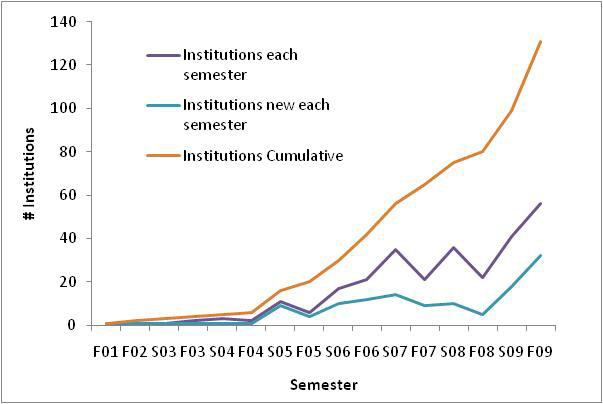nanoHUB’s Impact on Education
The contributions of nanoHUB.org to learning have been significant. Since its inception nanoHUB has been used in 379 graduate and undergraduate courses taught at more than 130 different institutions. The number of courses taught per semester has also grown, up from 28 four years ago to 64 today.
Courses and research seminars (with 34,063 and 11,076 users respectively) are the most popular nanoHUB downloads. In addition, 20,940 users downloaded podcasts, up from 8,161 in the last reporting year.
While classrooom use of nanoHUB is heaviest in the United States, it is also used in courses taught in Belgium, China, the Czech Republic, Germany, India, the Netherlands, Taiwan and the United Kingdom, among others.
Significantly, nanoHUB has at lease one user at nearly 20% of all 7,073 U.S.-domiciled .edu domains, and includes 47 of America’s top 50 engineering schools (as identified by U.S. News and World Report magazine), and by 88% of the top 33 physics and chemistry schools in the nation. in both categories nanoHUB simulation users run an average of 102 simulations and spend 5.95 hours per year on the site—up from 4.5 hours per year in other earlier reporting periods.
While there is room for growth, nanoHUB’s use at Historically Black Colleges and Universities, High Hispanic Enrollment Institutions and Minority-Serving Institutions is also noteworthy. In particular, Historically Black Colleges and Universities enjoy a highly intensive web-usage per student.
nanoHUB’s educational focus is concentrated on its Simulation-based Learning in Nanotechnology, which emphasizes innovative, outcome-focused and evidence-based instruction. The application of this knowledge stimulates new research inquiries and allows nanoHUB to integrate knowledge about how people learn with an understanding of how simulations can enhance learning outcomes. Four focus areas are employed. They are:
1. Instructional Design Resources: nanoHUB works with instructors to develop effective learning experiences based on the literature of how people learn.
2. Hands-on Workshops for Instructors: Up to four workships per year are offered to provide hands-on experience that helps instructors develop outcomes-based learning experiences using the most effective approaches.
3. Classroom Research Test-Beds: nanoHUB members work with instructors as they deploy new teaching methods to create resesarch test-beds to better understand learning issues and identify opportunities for more innovative pedagogical methods for using nanoHUB in education.
4. Learning Resoruce Development on nanoHUB: Members work with developers of textbooks and online learning resources to embed effective instructional design principles in the structuring of these learning resources.
Notable Quotes
"I visited nanoHUB during nine different lectures (of 38 total lectures), and used the tools and demos there to illustrate particular points in the lectures. In one case, I went to a source for which the link was on nanoHUB (the Virginia atoms to MOSFETs videos), but the rest of the visits were concerned with demos and tools for p-n junctions, MOSFETs, RTDs, and CNTs. I found it to be a very useful site for the students, and encouraged them to get their own accounts so as to use the tools to solve homework problems." David Ferry Professor of Electrial and Computer Engineering Arizona State University
"In the past two years I have been extensively working on carbon nanotubes and graphene ribbons for interconnect applications. The tools and educational material that are offered by nanoHUB have been instrumental in my research. I have used CNTbands 2.0, which is a tool for calculating the bandstructure of carbon nanotubes and graphene ribbons with various sizes and chiralities. I have found this tool quite useful in calculating the band structure of a variety of carbon nanotubes and graphene ribbons." Azad Naermi Georgia Institute of Technology
“nanoHUB has access to many wonderful resources, and I am impressed with its speed. nanoHUB shortens the learning curve.” Sansiri Tanachutiwat Ph.D. candidate University of Albany
“nanoHUB is of immense help for student researchers. I am so grateful for nanoHUB ...” lndranil bhattacharya graduate student Florida State University
"I find nanoHUB one of the most resourceful websites for research student and staff alike. The lectures, topics and open source codes on emerging technologies provide invaluable material to researchers in their early stages." Saket Srivastava University of Southampton
“nanoHUB opens up whole new levels of discovery. It's very easy for both education and research. What a great resource ...” Hans Mikelson Nanoscience Instructor Chippewa Valley Technical College
“There is a hunger for nanotechnology information out there and nanoHUB makes it accessible. Its worth cannot be measured in dollars and cents.” John Bean Professor of electrical and computer engineering University of Virginia

